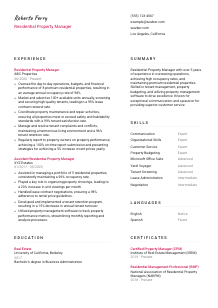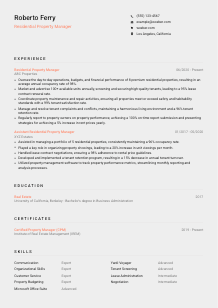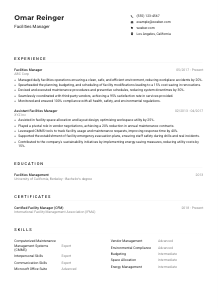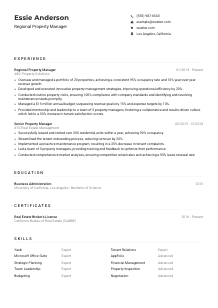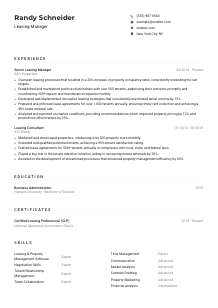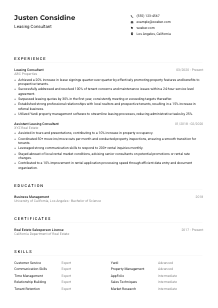Residential Property Manager CV Example
Overseeing homes, but your CV feels cramped? Explore this Residential Property Manager CV example, constructed with Wozber free CV builder. Learn how to showcase your knack for managing abodes to align with job desires, drafting a career journey as spacious and inviting as your best listings!
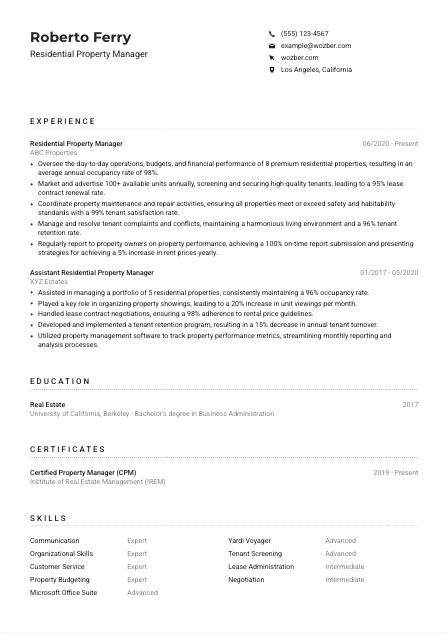
How to write a Residential Property Manager CV?
Aspiring Residential Property Manager, if you're aiming to stand out in the competitive real estate market, your CV needs to be as well-maintained and inviting as the properties you manage. Crafting an ATS-optimised CV that fits the job description like a key fits a lock is crucial. With the help of Wozber's free CV builder, including its ATS-friendly CV template and ATS CV scanner, you're about to learn how to turn your CV into a compelling portfolio that showcases your expertise in property management.
Ready to unlock the door to your next opportunity? Let's dive in!
Personal Details
The Personal Details section is akin to the front door of a property—it's the first thing hiring managers see. Making it inviting and reflective of the role you're applying for, especially for a Residential Property Manager position, is critical. Here's how to ensure your details are as welcoming and professional as the properties you aspire to manage.
1. Identify Yourself Clearly
Just as a property's address should be clear and visible, so should your name on your CV. Ensure it's prominently placed, using a clean, professional font. Think of it as the signpost on your property.
2. Match the Job Title
Mirror the job title directly under your name to form an instant connection with the role. As detailed in the example CV, stating "Residential Property Manager" aligns your identity with your career goal.
3. Essential Contact Details
Your contact information is the pathway to further conversation. Include your phone number and a professional email address, ensuring they're both accurate and up-to-date. Consider this like making sure the walkway to a property is clear and inviting.
4. Location, Location, Location
In property management, location is everything. Include your city and state to align with the job's geographical requirement—"Los Angeles, California," as seen in the job description. This confirms to potential employers that you're in the right market.
5. A Digital Footprint
Just as properties have online listings, your digital presence can boost your visibility. Including a LinkedIn profile or personal website, if relevant, can provide deeper insight into your professional world.
Takeaway
Your Personal Details serve as the 'curb appeal' of your CV. They must be tailored, professional, and aligned with the job's location and title requirements. This section sets the initial impression, so ensure it's an open, inviting pathway leading hiring managers to explore further.





Experience
Structuring your experience for a Residential Property Manager role is akin to laying down the foundation of a property. It needs to be strong, relevant, and showcase your abilities in managing residential properties efficiently. Let's align your career achievements with the job requirements in a way that captivates your audience.
- Oversee the day‑to‑day operations, budgets, and financial performance of 8 premium residential properties, resulting in an average annual occupancy rate of 98%.
- Market and advertise 100+ available units annually, screening and securing high‑quality tenants, leading to a 95% lease contract renewal rate.
- Coordinate property maintenance and repair activities, ensuring all properties meet or exceed safety and habitability standards with a 99% tenant satisfaction rate.
- Manage and resolve tenant complaints and conflicts, maintaining a harmonious living environment and a 96% tenant retention rate.
- Regularly report to property owners on property performance, achieving a 100% on‑time report submission and presenting strategies for achieving a 5% increase in rent prices yearly.
- Assisted in managing a portfolio of 5 residential properties, consistently maintaining a 96% occupancy rate.
- Played a key role in organizing property showings, leading to a 20% increase in unit viewings per month.
- Handled lease contract negotiations, ensuring a 98% adherence to rental price guidelines.
- Developed and implemented a tenant retention program, resulting in a 15% decrease in annual tenant turnover.
- Utilized property management software to track property performance metrics, streamlining monthly reporting and analysis processes.
1. Analyze the Job Description
Just as you'd assess a property before putting it on the market, start by dissecting the job description. Pay special attention to phrases like 'oversee the day-to-day operations' and 'manage and resolve tenant complaints,' as these are your keywords for ATS optimisation.
2. Present Your Role Clearly
Similar to listing property details, your job positions should be outlined clearly. Include your title, company name, and employment dates. This chronological structure helps hiring managers navigate your career path easily.
3. Highlight Relevant Achievements
Tailor your accomplishments to mirror the responsibilities in the job description. Statements like 'Oversee the day-to-day operations of 8 premium residential properties' directly reflect the sought-after skills and should be quantifiable to demonstrate your impact.
4. Quantify Your Impact
Just as property listings include sizes and capacities, your achievements should be quantified. Displaying improvement metrics, occupancy rates, or customer satisfaction scores offers tangible proof of your expertise.
5. Relevance Over Volume
Less can indeed be more when it's impactful. Exclude any unrelated achievements that don't contribute to your role as a Residential Property Manager. Focus on experiences that directly align with the job description to make your CV more powerful.
Takeaway
Your Experience section is the cornerstone of your CV. Presenting a clear, chronological view of your professional journey, specifically tailored to the job requirements, solidifies your position as a top candidate. Each line should reflect your suitability for the role, forming a solid base for your application.
Education
In the world of property management, your education lays the groundwork for your expertise, just as architectural plans are essential for building. Let's ensure your academic qualifications underscore your suitability for the Residential Property Manager role, showing you have the theoretical foundation to support your practical skills.
1. Highlight the Requirement
Immediate attention should be given to aligning your degree with the job's specifications. For instance, a 'Bachelor's degree in Business Administration, Real Estate' matches the job requirement exactly, making it foundational to your CV.
2. Format for Clarity
Maintain a clean, easy-to-navigate structure in this section—your degree, field of study, and institution should be clear at a glance, similar to a well-organized property brochure.
3. Degree Precision
Ensure your degree directly mirrors the job requirement. If the position calls for a 'Bachelor's degree in Business Administration, Real Estate,' list it exactly like that to enhance ATS optimisation.
4. Coursework & Achievements
For roles requiring specific expertise, relevant coursework or honors can provide added value. While this may be more applicable early in your career, it emphasizes your dedication to the field, akin to a property's unique features that make it stand out.
5. Other Educational Highlights
If your academic background includes memberships in relevant organisations or specific projects related to real estate, include these details. They add depth to your profile, similar to the amenities that add value to a property.
Takeaway
Your Education section should serve as a blueprint that clearly displays the foundation of your knowledge and skills relevant to Residential Property Management. Just as architectural details make a property unique, the way you present your educational background can set you apart in the eyes of hiring managers.
Certificates
Like premium fixtures in a well-appointed home, certificates add value to your professional profile, signaling your commitment to continuing education and expertise in your field. Let's ensure the certificates section of your CV speaks volumes about your dedication to the Residential Property Management profession.
1. Pinpoint Pertinent Certificates
Start with requirements directly from the job description, such as the 'Certified Property Manager (CPM)' or 'Residential Management Professional (RMP)' designations. These are your key certificates that highlight your specialized training in property management.
2. Focus on Relevant Achievements
In the realm of Residential Property Management, quality trumps quantity. Including certificates, that directly align with the job's needs shows that you've invested in your professional growth in areas that matter.
3. Include Dates for Freshness
Just as properties have renovation dates to indicate freshness, your certificates should display acquisition dates, especially if they're recent. It shows you're keeping up with the latest industry standards.
4. Pursue Ongoing Education
The industry is ever-evolving, and so should your expertise. Staying updated with the latest certifications not only enriches your skillset but also demonstrates your commitment to professional excellence.
Takeaway
Your certifications are an integral selling point of your CV, much like desirable amenities in a property. Focus on relevance and recency to indicate your ongoing commitment to professional development in the field of property management. It's an assurance to potential employers of your dedication and up-to-date knowledge.
Skills
Your skillset in property management is akin to a property's utilities: essential, providing comfort, and enhancing functionality. Here, you'll align your skills with the job's requirements, ensuring you showcase your competency in managing residential properties efficiently.
1. Extract Essential Skills
Start by identifying critical skills from the job description, such as 'Excellent communication' and 'Strong proficiency with property management software.' These are non-negotiables for your CV, serving as the foundation of your skill set.
2. Mirror the Job's Language
Directly match your skills with those listed in the job description. If 'tenant screening' and 'lease administration' are mentioned, these should be prominently featured in your skills section. This not only aids ATS optimisation but also instantly signals your suitability.
3. Prioritize Pertinence
Curate your skills to focus on those most relevant to the job at hand. Overloading this section can dilute the impact of your truly relevant skills, much like clutter detracts from the appeal of a well-designed space.
Takeaway
Think of your Skills section as the core features that make a property both functional and appealing. Highlighting these concisely and relevantly demonstrates to hiring managers that you're equipped with the necessary tools to manage their properties effectively.
Languages
In a role where communication is paramount, your ability to engage with a diverse tenant base can set you apart. Showcasing your linguistic skills can be an added bonus, akin to offering multilingual signage in a cosmopolitan residential area.
1. Identify Job Language Requirements
The job description specifies 'Proficient English language skills required.' This is your foundational language requirement, and your proficiency level should be clearly stated.
2. Highlight your linguistic range
While English proficiency is a must, additional languages can beef up your CV. For example, if you're fluent in Spanish, as noted in the example CV, it showcases your ability to communicate with a broader range of tenants.
3. Specify Language Proficiency
Be specific about your language skills. Categorize them by proficiency levels such as 'Native' or 'Fluent,' providing a clear understanding of your communication capabilities.
4. Consider The Role's Demographics
Especially in a diverse city like Los Angeles, highlighting additional languages you're fluent in can demonstrate your capability to manage properties in multicultural neighborhoods.
5. Continual Learning
Just as neighborhoods evolve, so should your language skills. Showing you're working on improving or adding to your linguistic abilities indicates an ongoing commitment to effective communication.
Takeaway
Your ability to communicate in multiple languages is a testament to your capability to handle a diverse portfolio of residential properties. Like unique amenities that add value to a property, your languages enrich your professional offering, making you a valuable asset to any real estate management team.
Summary
This section is your chance to engage the hiring manager, much like an enticing property description catches a potential buyer's eye. It's here that you distill your professional essence, correlating directly with the Residential Property Manager position's prerequisites.
1. Master the Job Essentials
Begin with a thorough understanding of the role. Reflect on key requirements like 'overseeing day-to-day operations' and 'ensuring properties met safety standards,' ensuring your summary mirrors these points.
2. A Compelling Opening
Introduce yourself as a professional steeped in real estate and property management, bringing over 5 years of experience to the table, as demonstrated in your CV example. This positions you as a seasoned expert right from the start.
3. Highlight Key Attributes
Detail your standout skills and contributions, such as maintaining high occupancy rates and implementing tenant satisfaction programs. This not only showcases your expertise but also your proactive approach to property management.
4. Keep It Succinct
Precision is key. Aim for a tight, compelling narrative that encapsulates your qualifications, skills, and distinct contributions in a few impactful sentences. Think of it as the 'curb appeal' of your CV.
Takeaway
Your summary is the highlight reel of your professional journey. A well-crafted one, tailored to the Residential Property Manager role, not only grabs attention but also persuasively communicates your value proposition. Let it serve as a beacon, guiding hiring managers toward selecting you for an interview.
Your Career Blueprint
You're now equipped with a comprehensive guide to strategically crafting your Residential Property Manager CV. By following these insights and employing Wozber's free CV builder, including its ATS-friendly CV templates and ATS CV scanner, you're setting the stage for success. Your CV is not just a list of jobs—it's the narrative of your professional legacy in the making. Go forth with confidence, refine your CV, and open doors to the opportunities awaiting you in the world of property management.

- Bachelor's degree in Business Administration, Real Estate, or related field.
- Minimum of 3 years of experience in residential property management or a related industry.
- Strong proficiency with property management software and Microsoft Office suite.
- Excellent communication, interpersonal, and organizational skills.
- Must hold a certified property manager (CPM) or residential management professional (RMP) designation.
- Proficient English language skills required.
- Must be located in Los Angeles, California.
- Oversee the day-to-day operations, budgets, and financial performance of assigned residential properties.
- Market and advertise available units, screen potential tenants, and ensure lease contracts and renewals are completed accurately and on time.
- Coordinate and oversee maintenance and repair activities, ensuring properties meet safety and habitability standards.
- Manage and resolve tenant complaints and conflicts with a high level of professionalism and customer service.
- Regularly report to property owners on property performance, occupancy rates, and financial metrics.






